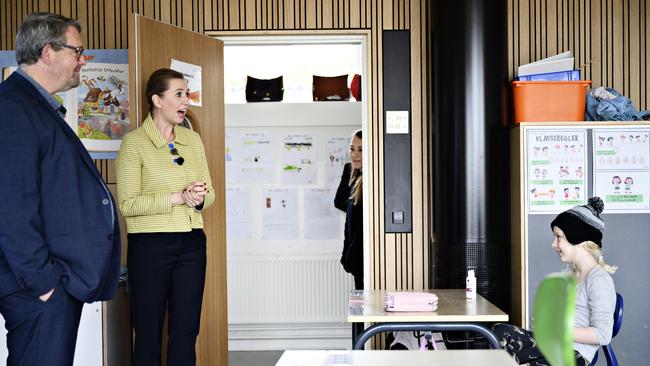Coronavirus: Schools and shops take first steps of Angela Merkel plan
Germany will allow most shops to open their doors on Monday and millions of pupils will go back to school in May.

Germany will allow most shops to open their doors on Monday and millions of pupils will go back to school at the beginning of May after Chancellor Angela Merkel announced her country’s first steps out of shutdown.
Ms Merkel warned, however, that Germany’s grip on its coronavirus outbreak was a “fragile and provisional success” as she said social-distancing measures, including a ban on gatherings of more than two people from separate households, would last at least another two weeks.
The path taken by Europe’s largest economy will be studied closely by its neighbours, including Britain and France.
Shops with up to 800sq m of space can resume trading next week and libraries, archives, zoos, botanical gardens, car dealers, bicycle shops and bookshops can all open too, regardless of their size.
Larger retailers are scheduled to reopen on May 4. On the same date, schools will admit children in the upper years of primary school and teenagers preparing for their end-of-school exams.
Many of the most tangible restrictions on daily life will remain in place. Germany has had more than 133,000 confirmed cases, but it has a thorough testing regime, and 3592 deaths, far fewer than other large European countries.
The bans on parties, picnics, and religious services and the closure of bars, clubs and restaurants will stay in force until at least May 3. The government will “strongly recommend” that Germans wear facemasks on public transport or in shops, but stop short of making it a legal obligation. Mass events such as concerts and football matches will remain prohibited until September.
Other European nations have begun to bring back some aspects of life before their lockdowns.
On Wednesday, children returned to schools and kindergartens in half of Denmark’s municipal districts, in spite of a petition against making families “COVID-19 guinea pigs” that drew 18,000 signatures.
The desks in classrooms are a minimum of 2m apart and teachers have been tasked with ensuring their pupils avoid physical contact or gathering in groups of more than two indoors or five outdoors.
The other districts have asked for a few days of extra time to adapt to the new rules.
Prime Minister Mette Frederiksen, who has emerged from the first phase of the coronavirus crisis as one of the most popular national leaders in Europe, said she had been “wildly impressed” after visiting a school in Valby, a suburb of Copenhagen.
“Some of the children described how hard it had been not to be able to give their friends a hug out of pure joy at seeing them again,” she wrote on her Facebook page afterwards. “That is something I can understand.”
Austria allowed DIY stores, garden centres and shops with an area of no more than 400sq m to resume trading on Tuesday, with strict rules governing the wearing of masks and the number of people permitted to shop in one place at the same time.
So far, there has been little evidence that Austrians are flouting the regulations, although long queues formed outside several home improvement stores.
The Czech Republic set out its own five-stage plan to restart its economy on Wednesday, beginning with craft shops, farmers’ markets and used car dealerships opening next Monday. Final-year students will also return to universities next week. Schools will be opened for younger pupils and those preparing for the equivalent of A levels on May 25.
Britain’s chief medical officer, Chris Whitty, said the UK was reaching the peak of the coronavirus pandemic and would be able to finalise its strategy for easing the lockdown within 10 days.
Professor Whitty said health officials believed that the trend in new infections was beginning to “flatten out” as the death toll stayed below 800 for the fourth day in a row.
Foreign Secretary Dominic Raab, who is deputising for Prime Minister Boris Johnson while he recovers from COVID-19, is expected to announce on Thursday night that lockdown restrictions will remain in place for a further three weeks. Mr Raab will say that it is too early to lift them.
However, Professor Whitty was clear that although the number of deaths may “bounce up” on Thursday because of delays in recording them over the bank holiday weekend, the overall trend was positive.
The Times



To join the conversation, please log in. Don't have an account? Register
Join the conversation, you are commenting as Logout